
Content Warning: This article contains frank discussion of rape and sexual assault.
Here we are. We took you through the events. We explained the epic and meaningful bastard rivalry. And now, at last, Julie (the union of Julia and Kylie) are here to talk about Winterhell’s most empowered lady: Sansa Stark. Or rather…an ineffable concept portrayed by Sophie Turner.
The Life and Lies of Sansa Stark
There are some characters on Game of Thrones that began with promise, but have slowly turned into caricatures of themselves. There were some that were clearly favored by the writers since the start. Then there’s Sansa Stark. Just watching, it kind of feels like showrunners David Benioff and Dan Weiss (D&D) never really knew how to deal with Sansa’s character, and probably wish they didn’t have to.
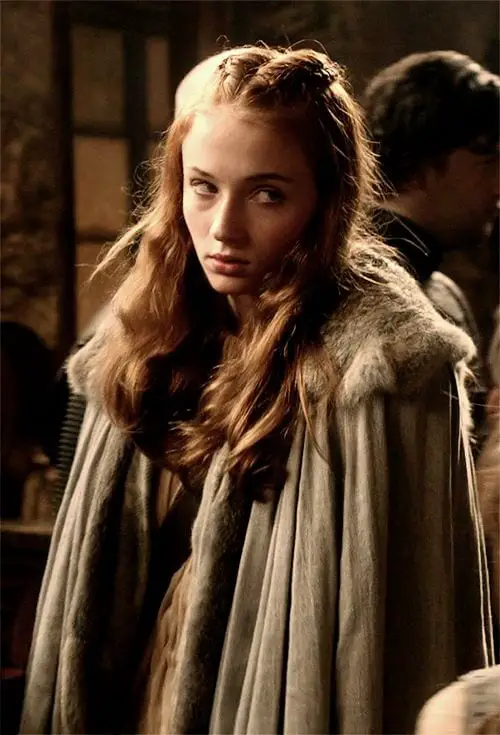
In the first season, Sansa was scripted such that the audience was meant to view most of her actions as wrong in some way—she was wrong to be excited about her betrothal to the prince, she was wrong to want to go South, and so on. Her juxtaposition to her scrappy, awesome sister was evidence of this, and though we could write an entire essay on how much D&D’s portrayal Arya wasn’t doing her any favors either. Suffice it to say that in the books, Martin at least presented both sisters from a sympathetic lens.
Once Ned was killed and Sansa became a political prisoner trying to navigate in King’s Landing, D&D seemed to pay no mind to her own story. She would just be sad, or react against the closeted gay man who was supposed to marry her, or kneel to the super nice dude she ended up marrying. Even scenes that were supposed to be about Sansa seemed more about her passivity, or like…Tyrion and Shae’s fights. It might surprise some to learn that Sansa’s book arc in King’s Landing was all about her internal resistance and her displays of agency where possible, while hiding beneath a “mask of courtesy.” Season 2 had flashes of this, like when she got snarky towards Joffrey in “Blackwater” (hey, who wrote that episode?), but otherwise her scenes were almost entirely focused on the other people in the room, something that continued to get worse and worse until “The Lion and the Rose.”
In Season 4, D&D either didn’t realize that there had been no focus on Sansa’s development, or they didn’t care, since they sprinted her ahead to this bizarre end-point where she was suddenly a master manipulator who earned the loyalty of the Vale Lords in one scene, and could use her feminine wiles to manipulate Littlefinger just as easily. Those of us who had the books to project from weren’t shocked, but the fact is, when Littlefinger talks about how Sansa learned to ‘maneuver from the best’ in Season 5, there were zero scenes that came to mind, unless it was that one time Cersei told her to fuck her way to the top. Also in “Blackwater,” by the way.
Then came Season 5, where D&D decided to back dial all that agency and intuition she had on display in “Mountain and the Viper,” and just pop her into the Winterhell storyline, in place of a tertiary character that made a lot more sense in context, defying all logic and good taste. There is nothing that can ever justify the idea that marrying one’s enemy and legitimizing their claim will result in REVENGE. Worse still, the only thing that Sansa actually did in Season 5 was get raped and scream at Theon enough until he helped her stop getting raped.
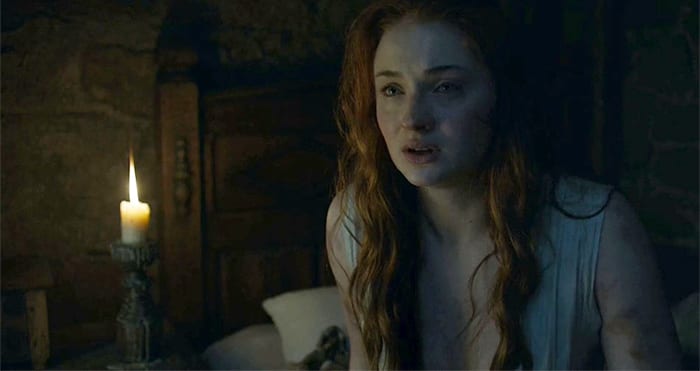
This is a very high-level summary, and we can go (and have gone) onto further detail about how this differs from the books, as well as why it’s bad in its own right. But the point we’re trying to make is that there’s not exactly a logical progression to how her character behaves, and though we do feel that D&D made an honest attempt to give Sansa her own story over the course of Seasons 5 and 6, it’s hard to make the claim that the themes of her arc or characterization were ever considered. With Sansa, her use in Game of Thrones’s narrative always boils down to “creatively it made sense, because we wanted it to happen.”
The Many Faces of Sansa Stark
Case and point, Sansa’s personality is so inconsistently penned that we’ve been referring to her as “The Sansa Stark Construct,” a collection of disparate characters that seem to come and go based on the needs of the scene. We fully admit that this began as a joke, but the more deeply we’ve thought about her arc in the last two seasons, the more appropriate it seems.
The Sansa Stark Construct began in “Mountain and the Viper,” when the famous ‘Darth Sansa’ sashayed down the stairs in her vampish attire, ready to kick ass and take names. This was supposed to be the same character who a season prior was joking with her prison-keeper husband about putting “sheep shift” into mattresses because she didn’t know the word “shit,” and who at the beginning of Season 4, made no active attempts to leave King’s Landing and was just randomly saved by a pop-up Ser Dontos.
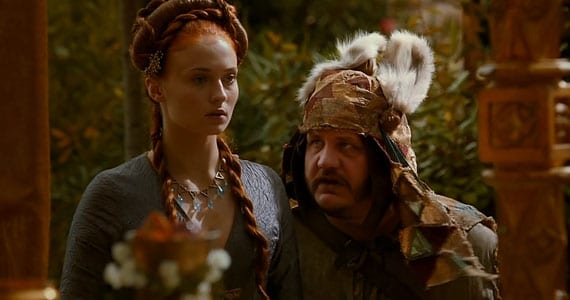
A lot of people took this as her “pawn to player” moment in the show, except that throughout the course of Season 5, her characterization was scrapped in favor of the idiot who trusts Littlefinger’s word with the most illogical plan ever presented to any character in any text ever. Then things got weirder for her as following her rape, she began to liken herself to her abuser and tell Theon she wished she could have done the same to him. Even though Sansa was never a priority to the show, she was at least a deeply empathetic character.
We made our little jokes about “Asnas Krats” then, and others had called her “Fansa” (fandom convention for ‘fake’) or “Sonsa Stork” (Spanish for stupid), but we all still knew it was one character.
Then Season 6 came, and holy crap. In one episode, she’d be terrified to do something very basic for survival and needed to be hand held through the most basic courtly customs, and in the next, she’d be wearing lipgloss and wrestling letters away from her brother, dispassionately reading rape threats aimed at her. In one scene, she’d be telling Jon how he should have the Lord’s bedroom and she trusts him implicitly, but then in the next get a poo-face while he was declared king as she just sits there passively.
Yes, it’s all still “Sansa,” but there is absolutely no way to predict how she’s going to behave or react to any given event, since she can be written with an entirely new personality within the same episode. Kylie actually thought we were exaggerating the Brittany/Sandra distinction, but no: after spending two episodes sassing everyone and asserting her authority often and loudly, she became this completely useless window dressing who, whenever she did open her mouth, just made everything worse.

Sophie Turner is a very talented actor, and we give her props for her performance and trying to make this work. She really does almost sell it. But the fact is, if you had to write down Sansa’s personality traits in a list, we could provide with scene after scene that would counter each point. Unless you consider “redheaded” to be a personality trait.
Seriously, think about it: if you write down “compassionate,” we can point you to the scene where she screams at Theon or watches Ramsay be eaten by dogs. If you wrote “intuitive,” we could point you to the scene where she said the perfectly wrong things to Lord Glover and Lyanna Mormont, pissing both of them off. And so on.
It’s not like we can’t think of other inconsistently written characters, especially within this damn show. But can’t she have a season-long personality? What’s worse is that if the writers don’t seem to have any grasp on who she is, then how the hell are we supposed to consider anything that happens to her remotely meaningful?
Case and point, even though D&D are setting up her rivalry with Jon for next season, there’s really no logical “meaning” that can be teased out of her withholding the information about the Vale Troops coming. We guess we could generously honeypot that she actually wanted Jon to perish, and was hopeful that in showing up late, she’d have nothing but corpses of his men to sweep aside as she claimed Winterhell. But this sits in contention with all the times she explicitly stated how she trusts him, even after the battle when she wanted him to have the Lord’s chambers for no reason we can think of besides genuine affection.
If she was hoping that the Vale Troops would shift the tide of the battle, why in Weisseroff wouldn’t she tell the battle commander about this, especially since all she wanted to do was get him to delay the fight until they had more men. And he only needed to delay it like, 20 minutes for this to work. Did she know how much of a shit battle commander Jon is, and therefore chose not to tell him, assuming he’d bungle that too? Though we’re not experts in war, that still seems like a hell of a lot of confidence for her to be placing in her own read of the situation, especially after fully admitting she doesn’t know jack shit about this stuff! (Not that she should. It makes sense she doesn’t.)
“I don’t know. I don’t know anything about battles. Just don’t do what he wants you to do.”
You can try and look at this from any angle you want, but the fact remains: she didn’t tell Jon, because D&D didn’t want Jon to know so that he could fight the battle against ridiculous odds, and that they could have a dramatically satisfying 11th hour save. Sansa’s motivations were at the bottom of their list of priorities.
Maybe for that reason, the only arc D&D were apparently able to dream up for her was completely uninspired and stock, with again the whole point seeming to be about the drama over the plot or implication for the character. In fact, rape and revenge might be the most tired trope ever when it comes to female characters, especially since it clearly led from her portrayal as kind of useless (in their eyes, certainly not ours), to being an Empowered™ player.

Player by Painful Experience
“Arya’s a rebel, and I think people are drawn to people who rebel against whatever the societal structures are. For me though, Sansa goes on one of the most interesting journeys; She doesn’t start out as someone who is really sharp, shrewd and tough, but she becomes that person. Arya is kind of always there, which is what’s great about her, but Sansa had to get there by painful experience.” —David Benioff
This above quote comes from a very recent interview, where Benioff and Weiss talked about the contrasting Stark sister journeys. It might floor you to know that in the books, they’re actually more or less perfect parallels for each other, but this is Game of Thrones, and a traumatized child soldier is cool, while her sister, who performed as she was groomed to, is stupid.
Look. We’re not in the business of putting words into D&D’s mouths, and in fact, the largest reason we write these retrospectives is to better understand their vision. We get that “painful experience” could have been about Sansa’s entire journey, since it’s not like watching her dad’s head get cut off was a Swiss picnic. However, it’s also impossible for us to ignore this quote as contextualized by the last two seasons.
We also can’t ignore the previous things D&D and other writers on the show have said. For example:
“Basically, when we decided to combine Sansa’s storyline with another character in the books it was done with the idea that it would be hugely dramatically satisfying to have Sansa back in her occupied childhood home and navigate this Gothic horror story she’s found herself in and, of course, to be reunited with Theon – setting her on the path to reclaiming her family home and becoming a major player in the big overall story.” —Bryan Cogman
Here, Cogman makes it clear that Sansa was not considered “on the path to reclaiming her family home” until she was popped into the Winterhell storyline last year. Which, as we already said, the only thing that she does there is get raped. This idea that Sansa was not “already there” prior to her raping is further supported by the narrative itself. Hell, even Sansa calls out how stupid she was for having trusted Littlefinger in Season 5, even though Season 4 made it clear that she didn’t.
Additionally, the infamous “Unbowed, Unbent, Unbroken” had a scene where Sansa insisted to Myranda that she was in control and couldn’t be scared prior to the wedding, only for the rug to be ripped out from under her.
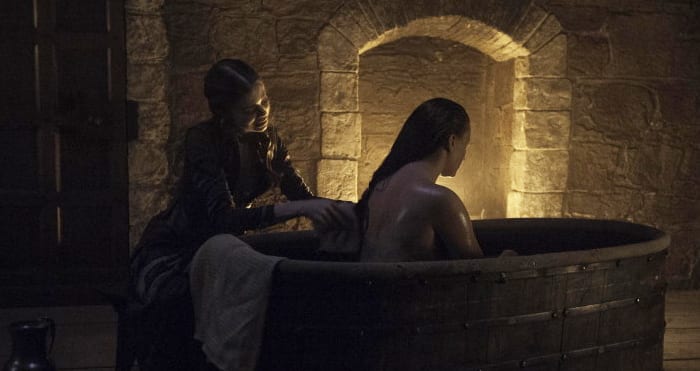
So, we’re really left with nothing else to conclude but that the “painful experience” she required to “get there” was, in fact, rape. The most generous honeypot we can come up with to avoid this horrific implication is that she also had to wade through a frozen river, and that was probably painful too. But we think it’s rather clear that D&D consider the events of Winterhell, aka Sansa being raped and not doing anything else, molded her into a worthier player.
Is it worth revisiting how Sansa in Winterhell made the opposite of sense? We’re not even talking about the “Sansa Marriage Strike” to harm her enemies or anything like that, though that is the most baldly stupid part of all of this. We mean, in terms of the narrative where Season 6 was always going to end with the Bastard Bowl, Sansa in Winterhell did nothing.
For one, Sansa being a Stark and being abused by Ramsay did nothing to change the geopolitical landscape. The Northern Lords didn’t care, no one tried to come to her aid but Theon (who fucked off to do other plot things), and Roose’s assertions that she was “the key to the North” were in not evidence, especially given how no one seemed to realize she was the heir to Winterhell (assuming that they thought Bran was dead). Secondly, Rickon was handed to Ramsay, so if D&D really felt they needed a Stark prisoner in the hands of the Boltons, they had one that wasn’t her. Thirdly, there is nothing that Sansa accomplished that affected the Bastard Bowl endgame that couldn’t have been accomplished had she stayed in the Vale. In fact, it would have been more logical for that 11th hour save had she come from the Vale, because otherwise, why didn’t she give Jon a heads up about the extra men?
If they’re implying that Sansa needed to be raped to have a motivation against the Boltons, then it’s passing strange to us that she began to have a panic attack when the Sansa Marriage Strike was first presented to her by Littlefinger. From what we could tell, the girl already had beef with their usurping of her father’s seat, or that whole Red Wedding thing. Also, if all of this was supposed to be about Sansa’s political development, this was an unbelievably personal motivator. We understand that only REVENGE can compel people to act on Game of Thrones, but if Arya is still motivated to kill Walder Frey without being sexually assaulted by him, then why couldn’t Sansa still be motivated to get rid of the Boltons?
Being very, very generous, Sansa was the one who persuaded the newly resurrected Jon to retake his home. But we also do have confidence that if D&D had kept Sansa in the Vale, they could have still motivated Jon through the Pink Letter alone (especially with Rickon’s imprisonment).
And yes. Agreeing to marry an enemy for revenge is so, so unbelievably dumb. We can’t say this often enough, and even Sansa said it this season. So…on that matter, the prosecution rests.
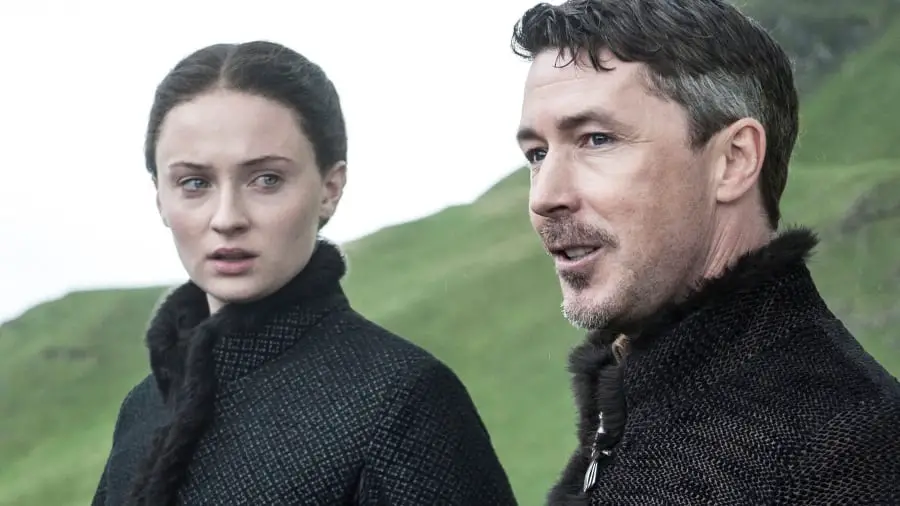
Our point is, this rape was unmotivated. It’s especially unmotivated since the end of Season 4 showed us a Sansa wielding political power over the Vale Lords and lying to get her way. It was admittedly out of the blue, but it seemed like she had arrived, at least. How was she not sharp, shrewd, and tough in those scenes?
Rape and Revenge
So if that’s the case, why did they rape her? Well, we do know part of it was because they wanted Ramsay’s “storyline” from A Dance with Dragons to be on their screen, and popping Sansa into the role of Jeyne Poole made creative sense to bring that about. Or something. But at the same time, we do actually think that D&D planned Sansa’s arc for both Season 5 and Season 6 together. Which is not nothing on this show. But pretty much since the backlash over Sansa’s rape hit, we were promised that she would be strong, and there’d be a really good payoff. To that payoff, here’s what Weiss had to say about Ramsay’s death:
“His dogs were such a thing for him, in this season and seasons past. They’re an extension of his own horrible urges, and the idea that they would be turned against him and that it would happen at Sansa’s hands made a lot of sense to us. This isn’t the little girl who wanted to dress up like a princess anymore.” —Dan Weiss
Here’s the thing. Rape as a topic is not something we feel should ever be off-limits in fiction, especially because it is so prevalent, and pretending it doesn’t exist is hardly helpful. In fact, talking about these things in a fictional context often helps cultural dialogue, since fandoms are more or less the forums where these conversations are taking place. Fiction kind of…matters.
That being said, the utilization of rape (or really any exploitative storytelling device) needs to be pretty justified, and it can be a real challenge to portray it sensitively and intelligently. There are certainly ways that a rape storyline can push our cultural zeitgeist in a positive direction. Jessica Jones, for example, took the time to explore the lasting trauma, while also tearing down misconceptions about entitlement and revenge in many ways.
In Game of Thrones, they chose to utilize one of the most overused and damaging ways rape is depicted in fiction: Rape and Revenge. Just to contextualize how tired this is, it was a popular type of exploitation film starting in the 1970s.
The way it’s generally used is to convey to the audience that the woman getting her revenge is so empowered as a result of it that her revenge is a very good thing. This also furthers the idea that rape has entertainment value, since it spurs such a good, kick-ass story afterwards.

Look. There is absolutely no right or wrong way to respond to being raped. There are most definitely women who want to, or do take violent action against their abusers. And that can even feel good. However, and we hope this isn’t controversial to say: violence isn’t healing.
Even though Lapis Lazuli, in Steven Universe (you know…that kid’s show), took understandably violent action against her abuser Jasper and admitted to liking it, it was clear that this wasn’t a healthy mindset for her. Which is why she ultimately rejected it, because she wanted to push towards being in a better place. And it only took an 11 minute cartoon episode to explain that.

But that’s not what D&D did with Sansa. This was supposed to be a fist-pumping “yahs queen” kind of moment, where we were meant to be happy that she exacted her revenge. We were supposed to be happy that she was able to smile to herself as Ramsay was killed in a horribly gruesome way.
That should be worrying. We don’t believe in any of this “she’s just as bad as Ramsay now” false equivalency bullshit, especially because lashing out is sometimes the only way survivors feel equipped to defend themselves. However, it’s very hard for us to see this as a story worth telling, for one, or that it was told particularly well.
What did this accomplish other than giving an extremely tired and exploitative use of sexual assault in fiction one of the largest cultural platforms it could have? Add to that how we’re supposed to be uncritically happy that Sansa is in such an unhealthy place as to be taking pleasure from this level of violence, along with the fact that her rape served as the catalyst to make her a competent player in the eyes of the audience.
It’s bad. It’s really, really bad when you think about Benioff’s quote saying (in so many words) that Sansa needed fixing, unlike her cool, badass sister.
Kylie has already tackled the way violence isn’t actually empowering, and Jess got into this as well, but there’s no denying that we were meant to find Sansa’s violence empowering. There’s also no denying that therefore, rape was the plot device which empowered her. Hopefully we don’t need to explain why this is a wee bit of a problem.
Are D&D so uninspired that they couldn’t think of anything else for Sansa to do? Or is it that they truly couldn’t imagine someone lacking in Arya’s skillset becoming a player without something traumatizing happening to her?
Queen in the Corner
Because hey, we have an idea: what if instead of raping Sansa, D&D actually spent time on her political development? In fairness, they pay lip service to having established her as a political figure, like when Littlefinger told her, “But even the most dangerous men can be outmaneuvered. And you’ve learned to maneuver from the very best.” The same is true when she sometimes asserts her political knowledge, or demonstrates ambition, like during the war council when she mentions how she has the Stark name and the North will rise for her.

But in this season, Sansa’s political ambitions seem to completely disappear, at least until they’re necessary again to establish the Jon vs. Sansa conflict—what we assume is going to take center stage next season.
Excuse us for being pedantic, but let us explain a thing to you called male preference cognatic primogeniture. Under this system of inheritance, which is practiced (at least on paper) in all parts of Westeros (except Dorne), titles, lands, etc. move from a parent to a child with the preference being towards the male line. So all the sons and their descendants come before all the daughters and their descendants in the order of succession, but all the daughters come before uncles or other descendants in the male or female line. And everyone comes before bastards, because dems da berries. It does get quite complicated when bastards are legitimized, but that’s not the case here at all, so we can ignore this consideration. We will fight against conflation between the show and the books until our dying breath, but there’s every indication that this system is also in place in Weisseroff.
Rickon died, and Bran is presumed dead. That means that Sansa is the next person in line to the Winterhell seat in the eyes of the Northern Lords. And this has not exactly been trivial in the series as a whole: that’s why Tywin wanted Tyrion to marry her, and that’s why Roose wanted Ramsay to marry her. Because through her, they could legally rule the North.
Add to this the fact that the battle played out with Jon stupidly getting everyone killed, and Sansa saving everyone through her coalition building that she accomplished in Season 4. So why in the fuck was she not made Queen in the North? She’s Robb’s heir, at least in absence of any will that legitimized Jon, and there’s no reason that any Northern Lord would be overlooking this. Especially because she was sitting two feet from Jon. Hell, it doesn’t make any sense that he was the one ordering Ramsay to be tied up in the kennels or banishing Mel from Winterhell, since she is the Lady. Jon even said this to her! The only status Jon has is being her brother.

Lyanna as the mouthpiece for King Jon is just icing on the sexism crap cake here, because it’s very difficult to figure out why else D&D would have made a King Jon over Queen Sansa. Not that they were like, “let’s do this sexist thing,” but that their brains literally overlooked this option. Unless this is supposed to be a Watsonian point, and it’s the Northern Lords who are just that sexist? This would be fine, if Jon actually did fuck all to earn his crown, or if the 10-year-old girl wasn’t the one suggesting it.
Probably the case is that, and this is pure guesswork, Jon becomes King in the North in the books (likely because of Robb’s will that legitimizes him and specifically disinherits Sansa), and this could potentially lead to conflict between the siblings given the trajectory she’s on.
The issue is, like every other time they try and adapt a plot-point without the same context, the way D&D are going about setting up the Jon/Sansa tension makes no sense. For one, it requires her character to vacillate between totally trusting and loving Jon and being totally jealous of his accomplishments, and for another it undercuts her political development, because all this suspicion seems to be the result of Littlefinger whispering in her ear. We are hesitant to discuss this now, because we haven’t see this play out, but we are worried that they seem to be setting up Season 7 with Sansa as power-hungry and a bad sister, jealous of Jon, the chosen king. Since again, she’s actually right, legally speaking. The last thing we need is a woman’s ambition to be framed as negative on this show, while a man’s incompetence is rewarded over and over.
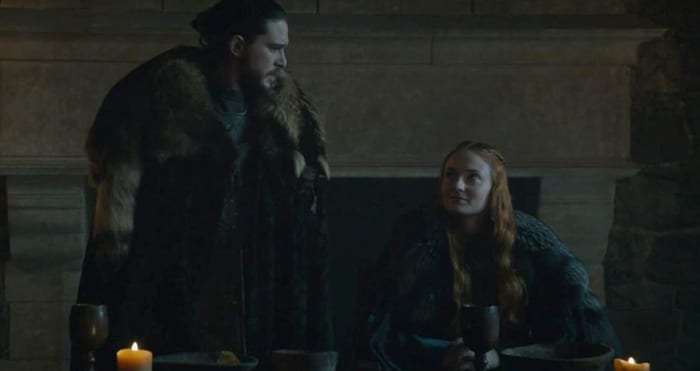
The Pretty Picture
Speaking of that ambition, we do have to take a moment to try and parse out what the hell they’re going for in her relationship to Littlefinger. We’re not even going to get into the idiocy of his motivation revealed as wanting the Iron Throne with her as his wife—you do you, Petyr. But the portrayal of this relationship has had us confused for quite some time.
Last season, Sansa and Littlefinger seemed to have a number of flirty scenes. If that’s not how these were supposed to come across, then please explain to us her teasing him over beer drinking, or that bizarre “guess I’ll be a married woman when I see you next” line she said before they kissed. That kiss! What was that kiss?! We don’t think we can exactly be blamed for assuming that their relationship is supposed to be at least quasi-romantic.
This season, we’re lucky enough that D&D are here to explain how Sansa feels about Littlefinger:
“Sansa’s gotten pretty good at playing the game. When she sees Littlefinger though, it’s not about politics, it’s not about trying to manipulate him or anything…he betrayed her in the worst possible way, so in her mind, everything horrible that happened after that, he’s to blame for it. I think it goes through her mind just how satisfying it would be to see Brienne cut him in two, just right here, but she doesn’t, and that she doesn’t is an interesting quality of Sansa. She started to look a couple of moves ahead, and she started to think ‘is it possible this person will be more useful to me alive?’” —David Benioff
We’re sorry… We could definitely tell that Sansa was mad at Littlefinger and not interested in letting him off the hook for Season 5’s writing, but the idea that she kept him alive because she’s looking a couple of moves ahead is just not anything we could have pulled from this scene in and of itself. Especially because she more or less dismisses his help on the spot. Why not agree to it, but then look a couple moves ahead where she could maybe tell the Vale Lords the truth about him arranging the marriage so she can take control of that army herself, or something? It wouldn’t be the first time she’s pulled one over on him with that exact group of people.
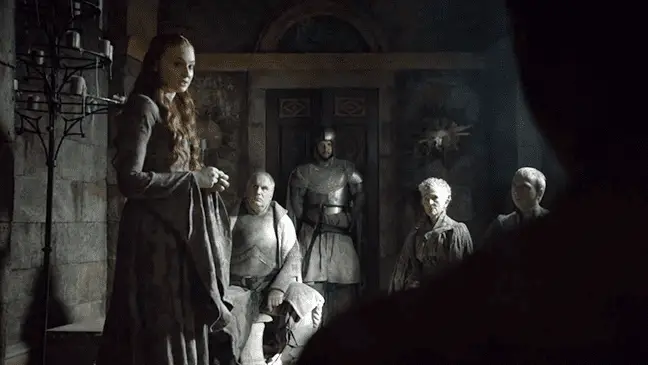
Then, we can totally track the grudging “maybe I should check to see if Blackfish would help,” along with her finally writing to him to bring the Vale troops to Winterhell. She was desperate for the numbers, and even though she didn’t want to give the guy who sold her to her rapist any credit, and certainly didn’t want him as an ally, it makes sense. It also makes sense when she told Jon that she didn’t trust Littlefinger, because why the fuck would she, or anyone?
But then she tells him that the image of him on the throne with her as his wife is a “pretty picture”? We suppose it’s possible that was meant to be sarcastic or dismissive, though again, not really something that was made clear at all. Then, the final scene seems to prove that she should be listening to Littlefinger, because he was totally right about Jon taking the King/Queenship in the North from her.
So, again, what are they going for? Are they trying to hint that Sansa is going to turn into somebody like Littlefinger? Because that sounds like the opposite of something enjoyable to watch. Plus why is it that Sansa needs a dude to draw these very easy connections for her? Why are they positioning her to be a tool in his political ambitions again, as well as to be sexually exploited again? Unless she is supposed to have earnest interest in him?

Again, we’re not exactly going to panic about this until we see the next season, but forgive us for being not optimistic, taking everything else into account.
A Very Meta King
The truth is that after six years of watching Game of Thrones, we do have some confidence in our predictions, especially since we sort of entered the void with Watsonian analysis some time ago. It would seem in the pattern of D&D’s writing to pit Jon and Sansa against each other, with Jon being portrayed as the more sympathetic actor.
Frankly, we need to look no further than this season’s Winterhell plotline to see that. Sansa did every single thing right when it came to building this coalition, but she got fucked over each time and ultimately ignored as the logical candidate for leadership. Jon, meanwhile, spent all season asking himself, “would an idiot do this thing?” and if the answer was yes, then he’d do it. And yet, he was given a kingship, as well as everybody’s praise for having saved the North.
What episode were the Northern Lords watching?
It’d be like giving an Emmy for best writing in the script that included snippets like this:

Or, you know, rewarding a story that doesn’t focus on anything with its characters, or really anything at all past shocks and stunning visuals.
So yes, we 100% assume Jon is going to prosper in Season 7, and that Sansa will remain an afterthought at best. As for at worst, well…we’ve just seen it.
We’re sure that after reading this retrospective in full, you are fully Team Cardboard! You can get a baseball tee to support them at our store, along with some merchandise of dramatic satisfaction…and salt.

If you enjoyed Julie’s thoughts on this plotline, then be sure to check out the Game of Thrones/A Song of Ice and Fire podcast starring Julia and Kylie, Unabashed Book Snobbery! You can subscribe/listen on iTunes, subscribe to our RSS feed, search for “Unabashed Book Snobbery” in any podcast app, or find a complete list of UBS episodes on Kylie’s personal blog. The Ballad of the Bastards is told in two parts (Part 1/Part 2).
Images courtesy of HBO

